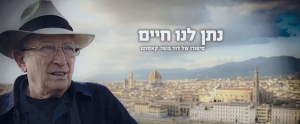FEATURES Back on the banks of the Arno River, in memory of Nathan Cassuto
As a child, he remembers taking walks, sometimes close to the Synagogue. And his love for art and beauty, which his father passed on to him during the unforgettable visits of the most important landmarks of their city. These fragments of life are anchored in the memory of David Cassuto, a former deputy mayor of Jerusalem, and son of the great Rabbi Nathan Cassuto, who was killed in a Nazi camp and, prior to that, had been the head of the Jewish Community of Florence as well as a leading figure of the undercover assistance network which heroically helped persecuted Jews. It was a betrayal that brought about his capture and deportation to extermination camps.
Over the past few months, David went back to Florence to tell his father’s story, but also to thank those who offered assistance to him and to his family at that time. His was a testimony travel documented by the Yad Vashem, the Holocaust Remembrance Centre in Jerusalem.
The documentary begins at the Shoah Memorial in Milan. Many Italian Jews were deported to camps from here and Liliana Segre had the word “Indifferenza” (“Indifference”) written in bold letters at the entrance of the building.
“While it has now become a museum, it was once a place of deportation”, said Cassuto, in front of his parents’ names, Nathan and Anna. The latter survived Auschwitz but was killed in the Hadassah medical convoy massacre in 1948.
“I feel Florentine, I am proud of my identity and I’ve always tried to act accordingly, whichever activity I was undertaking, from my job as an architect to my institutional commitment”, he stated in a recent interview.
“I haven’t lost sight of what I was taught during childhood, the humanism I’ve come in touch with since I was a child has never left me. I will give an example which is quite meaningful in my opinion: when I was vice-mayor of Jerusalem, I was supposed to attend meetings with international leaders. Before leaving for these meetings, I was often told: ‘You’re a Florentine, you have an extra gear for representing us at best’”. His link to his origins can be clearly perceived/noticed in his look/eyes, admiring Florence’s marvels, enchanted by the many landmarks of the Renaissance but still able to see through the light of this glorious past, into the darkness which marked more recent history and caused wounds that have not been healed yet.
Translated by Sara Facelli and revised by Mattia Stefani, students at the Advanced School for Interpreting and Translation of Trieste University and interns at the newspaper office of the Union of the Italian Jewish Communities.

